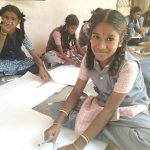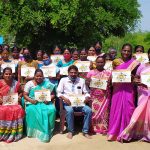HEALTH
Demystifying myths and empowering girls with knowledge
When I had my periods, I used to rely on my peers help to me manage and prepare for the menstruation cycles. CARE India’s campaign helped me to improve my understanding of this natural process, so I am sharing key information with the younger girls in the community as I am confident about guiding them properly regarding menstruation.
– Jayashree, Girls Higher Secondary School, Kattumannarkoil
Millions of girls from socially and economically marginalised communities have an unmet need for sexual and reproductive health (SRH) information and services. This affects their well-being and quality of life in a big way. Many of these girls are pushed into early marriage, which leads to early pregnancy, thereby forcing them to drop out of school and give up any aspirations of higher education, a good job and a healthy life.
To address this challenge, CARE India’s Kanya Sampurna project is providing SRH services to adolescent girls from marginalised communities in Cuddalore, Tamil Nadu. The primary objectives of the project include building knowledge, increasing access to health and nutrition services and addressing inhibiting discriminative cultural practices through community outreach initiatives, involving men and boys.
The project reaches out to adolescent girls in the age group of 11-18 years with basic health, nutrition, and career guidance services to build knowledge and strengthen their voice to raise concerns, share opinions and decide on their own. SRH services are critical for helping girls to choose their own study and career paths, hence the project is organising a series of special campaigns to increase the awareness levels of adolescent girls and boys, along with the entire community.
The Action 4 RED campaign was organised to increase the knowledge of adolescent girls by focusing on the four key aspects of menstrual hygiene:
(1) breaking the silence
(2) removing the taboos
(3) menstrual hygiene management messages
(4) safe disposal of sanitary napkins
 The campaign was organised at 13 high and higher secondary schools in Kattumannarkoil and Srimushnam blocks between June 18-20, 2019, reaching 2,270 girls in the age group of 11-18 years. As part of the campaign, the girls reached out to the nearby communities through rallies around schools. The key messages were delivered through songs, games and competitions, which were organised to help the girls share their learnings and experiences in the form of drawing, slogan writing and storytelling.
The campaign was organised at 13 high and higher secondary schools in Kattumannarkoil and Srimushnam blocks between June 18-20, 2019, reaching 2,270 girls in the age group of 11-18 years. As part of the campaign, the girls reached out to the nearby communities through rallies around schools. The key messages were delivered through songs, games and competitions, which were organised to help the girls share their learnings and experiences in the form of drawing, slogan writing and storytelling.
The feedback collected from the participants of the campaign revealed that close 25% of the girls were first generation learners. Close to 18% of the girls reported that they had been sent back home if they were menstruating, while 80% of them reported that the schoolteachers provided pads if their periods suddenly started during class. The campaign also sensitised the teachers on how to be helpful and supportive to girls so they can overcome barriers around menstruation at school.
Now, the CARE India team is getting several requests from other school to organise menstrual hygiene awareness events, and the health and ICDS departments are willing to be a part of the campaign to reach out to girls with key messages around menstrual hygiene.
CARE India’s Kanya Sampurna project is reaching out to thousands of girls in the remotest villages of Cuddalore district, Tamil Nadu and providing basic and critical information about SRH, career guidance, nutrition and leadership so that they can lead a healthy and decent life with dignity.





